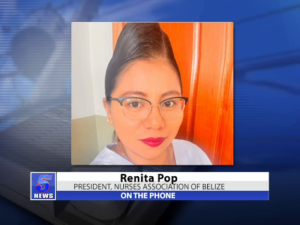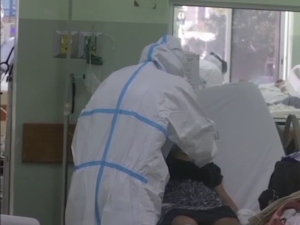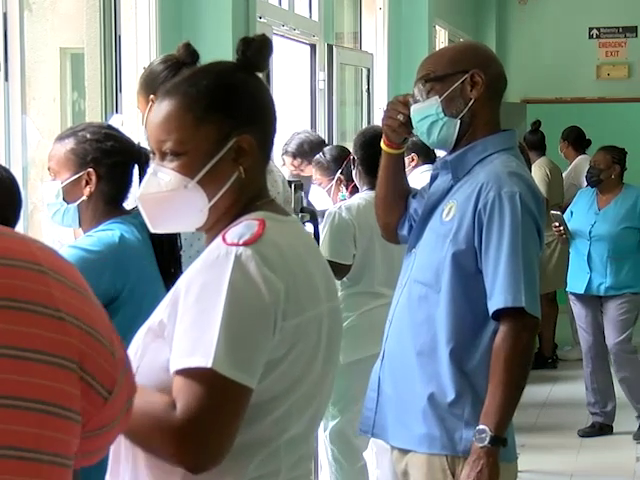Brain Drain Persists in Health Sector
Brain drain is when a significant number of persons leave an industry in search of better opportunities or working conditions. Over the past two years, the K.H.M.H. has lost around fifty nurses and doctors and, during COVID, twenty-five staff members stepped away, placing a heavy burden on those who were left behind to cope with the growing number of patients. Brain drain is the focus of our story for our Belize on Reel segment this week and we’ll use the nursing profession as one example of how brain drain can affect a system of work. News Five’s Marion Ali reports.
Marion Ali, Reporting
Developing countries like Belize face fierce competition in meeting the payscale and benefit standards that exist for employees in specialized fields of work in developed countries. The nursing profession is one area that has lost a lot of workers over the last three years.
Andrew Baird is a practical nurse at the Karl Heusner Memorial Hospital and sits on the board of directors as President of the KHMH Workers Union. He says the benefits in developed countries are far greater.

Andrew Baird
Andrew Baird, Practical Nurse, K.H.M.H.
“In Belize nurses do not have as much benefits as one would think. Out in the U.S. and other parts of the world, prior to leaving Belize, these nurses are offered signed bonuses. And signed bonuses are around $3,000 to $5,000 U.S. per nurse, per month. And these nurses are also being offered homes – a place to stay. The benefits and the conditions are even much more and the least to say, the salary that is being given to the various nurses in the outer world.”
Renita Pop is the President of the Nurses Association of Belize. She shared statistics with us, indicating that nurses who study in Belize are still leaving the field. She compares the migration of nurses from 2021 to 2024.

Via phone: Nurse Renita Pop
Via phone: Nurse Renita Pop, President, Nurses Association of Belize
“It has been noted that more nurses are requesting license verification and most of the times when our nurses do this it’s because they’re preparing to leave Belize, not necessarily leaving the profession, but leaving the country to practice nursing elsewhere. There has been an 11 percent decline from 2001 to 2024, practically saying that we’ve lost over 100 nurses from 2021 to present.”
 According to Pop, registered nurses have recorded the highest number of healthcare professions that have left in search of greener pastures. Nonetheless, there are efforts by the Ministry of Health and Wellness to fill the void.
According to Pop, registered nurses have recorded the highest number of healthcare professions that have left in search of greener pastures. Nonetheless, there are efforts by the Ministry of Health and Wellness to fill the void.
Andrew Baird
“I know that the Ministry of Health has been trying to come up with ways to get nurses from other countries like within Central America and even back to the Philippines.”
 Via phone: Nurse Renita Pop
Via phone: Nurse Renita Pop
“What we have done from the association part is the lays with the Ministry of Health and Wellness – retention packages to keep our nurses home. And at our last conference a proposed retention package was presented, which we are hoping that it comes through, where the chief nurse and the Minister of Health are working hand in hand to present a paper to Cabinet, which will include a variety of incentives for the remaining nurses that are here in Belize. And of course, the ministry continues to assist by providing scholarships for speciality fields such as midwifery, operating room nurses, scrub nurse, and public health nursing.”
The Ministry of Health and Wellness has been offering scholarships to attract nursing students; however, Baird says that even at the end of a four-year program, there aren’t enough nurses in the healthcare sector. At the K.H.M.H., there is still a shortage of about thirty nurses in various areas. What it does, according to Baird, is extend their shifts. He looks to the ministry to find quick workable solutions.
 Nurse Andrew Baird
Nurse Andrew Baird
“In reference to scholarships, scholarships – you’re looking at four years from now. I’m saying the ministry. along with all the stakeholders must prepare a long term and a short-term plan to fix the issue of nurse shortage.”
Marion Ali
“What would be your suggestion for a short-term solution?”
 Nurse Andrew Baird
Nurse Andrew Baird
“Maybe we should dig back into some of the retirees.”
Marion Ali for News Five.







Facebook Comments